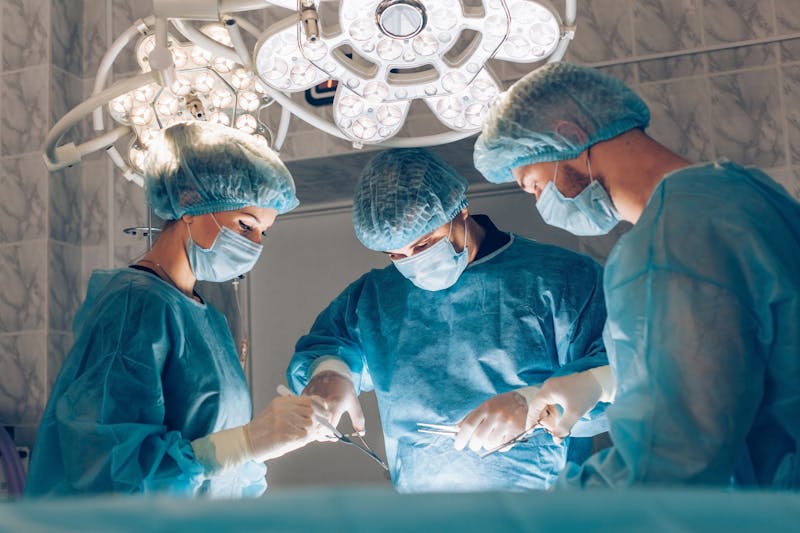
Their humble roots began in 1970 in Phoenix, Arizona, with the first ambulatory surgery center (ASC) “squeezed between neighborhood shops and a Baptist church,” according to The Arizona Republic. For $90, a child could receive an incision to relieve pressure on the inner ear.
Today, across the U.S., there are about 5,800 ASCs (also called same-day surgery centers or outpatient surgery centers), which perform an estimated 30 million procedures annually. And those procedures have come a long way from a tiny incision made in a child’s eardrum. They include complex operations ― such as spinal surgeries, total joint replacements, and cardiology procedures, among others ― that have moved the needle in terms of what medical procedures can take place outside a hospital without the staff and lifesaving equipment necessary to respond to an emergency, where seconds count.
So, how risky is surgery at an ASC?
The good news is that surgery centers successfully perform most operations without complications. And, of course, surgery, regardless of where it is done, is never risk-free. The bad news, though, is that when complications arise, patients may be in serious medical danger.
An investigation by Kaiser Health News and USA Today Network published in 2018 found that 260 patients died since 2013 after same-day procedures performed at surgery centers across the U.S. The team of journalists ― which examined autopsy records, legal filings, and more than 12,000 state and Medicare inspection records, and interviewed dozens of doctors, health policy experts and patients ― additionally found that these centers call 911 thousands of times each year for patients who experience complications ranging from minor to fatal.
The dangers of ASCs made national headlines in September 2014, when comedian Joan Rivers died in a New York City hospital one week after she stopped breathing during what was supposed to be a routine procedure for a hoarse throat at an outpatient endoscopy center on Manhattan’s Upper East Side. Rivers’ daughter, Melissa, sued the doctors and clinic for medical malpractice. The suit, which settled in May 2016, alleged that doctors performed unauthorized medical procedures, took cellphone photos of the 81-year-old comedian while she was under anesthesia, and failed to act as her vital signs deteriorated.
While Rivers may be the most high-profile patient to die from a procedure at an ASC, the investigation by Kaiser Health News and USA Today Network uncovered many other tragedies, including:
- A 58-year-old mother of three died of internal bleeding that was cutting off her windpipe, a well-known complication of the spinal surgery she had undergone, when her doctors left the ASC for the day and no one else knew what to do.
- A 35-year-old father of three suffocated after having been sent home too soon from upper-spine surgery. As he struggled for air, he pounded on the roof of his car in frustration as his wife sped him to a hospital.
- A 67-year-old woman stopped breathing on the operating table during what was supposed to be a routine colonoscopy. The doctor could not find the right sized air tube to save her, and 33 minutes elapsed before paramedics were able to insert a breathing tube. By then, it was too late, and the patient was taken off life support two days later.
- A 12-year-old boy died from complications during a tonsillectomy. His family alleged in a lawsuit that the center and anesthesiologist gave him an anesthetic that carries a warning about cardiac arrest risk in young boys. A paramedic who responded to the center’s 911 call told state investigators that when she asked who was in charge of the resuscitation efforts, no one replied.
- A patient died during a two-hour car ride home from a sinus procedure after doctors gave her a drug to reverse her dropping blood-oxygen level, which was a reaction to anesthesia, and then discharged her an hour later at 3 p.m. on the Friday before President’s Day weekend. Her husband, who was driving the car, was not informed of the complication, and thought his wife was napping in the backseat. Their daughter told the investigative journalists that she felt the center’s staff wanted to start their holiday weekend early.
- A 2-year-old girl died after turning blue in the car on her way home from tonsil surgery. Her mother, who raced into an emergency room shouting for help, felt that the center discharged her daughter too soon because of an impending snowstorm. In a lawsuit, the child’s parents alleged that the center never should have been treating their daughter because her sleep apnea, irregular heartbeat and very heavy weight for her age required an inpatient setting under hospital care where she could be monitored overnight.
With Their Lives at Stake … Why Do Patients Select Ambulatory Surgery Centers?
In an age where high insurance deductibles and co-pays can leave cash-strapped patients with thousands of dollars of medical bills, ASCs are pitched to consumers as a safe, economical alternative to hospital care. Indeed, a 2019 report by medical publisher Becker’s Healthcare examined the median cost of four medical procedures performed at ASCs in Virginia as compared with hospitals and found significant cost savings as follows:
- Arthroscopic knee surgery:
ASC: $4,653
Hospitals: $7,061
- Rotator cuff surgery:
ASC: $9,290
Hospitals: $13,537
- Shoulder arthroscopy:
ASC: $8,819
Hospitals: $13,324
- Tonsillectomy:
ASC: $3,433
Hospitals: $6,944
Another factor is direct-to-patient marketing. The Ambulatory Surgical Center Association (ASCA), a national organization whose mission is to advance ambulatory surgery, touts non-economic benefits for patients including modern facilities, trained medical staff, and the ability for patients to recover in the comfort of their own home.
But look beyond the ASCA’s glossy brochures and reassuring videos featuring warm and caring doctors and nurses, and you will find economic forces within the healthcare system that have fueled extraordinary growth of the ambulatory surgery industry over the past 30 years.
First, Medicare, which benefits from the cost savings provided by ASCs, has contributed to their moonshot by gradually adding increasingly complex procedures to its ASC-payable list. In 1982, Medicare was willing to pay for approximately 200 procedures. Today, that number has ballooned to more than 3,500 procedures that span a wide range of medical practice specialties, including:
- Orthopedics
- Ophthalmology
- Pain Management
- Endoscopy
- Podiatry
- Otolaryngology
- Obstetrics/Gynecology
- Dentistry
All told, ASCs save the Medicare program $2.3 billion annually, according to data from the ASCA. If past behavior is the best predictor of future behavior, we should expect that Medicare will continue to approve more same-day procedures for ASCs as the insurance program continues to fight rising healthcare costs.
Second, in 1993, Congress incentivized physicians to open their own ASCs by exempting them from the Stark Law, which prohibits doctors from referring patients to any health services entity in which they, or an immediate family member, have a financial relationship.
And open ASCs ― they did. A 2019 study by The Leapfrog Group, a nonprofit healthcare watchdog organization, found that 29 percent of ASCs are owned by single or multiple physicians; 38 percent are owned by a physician/management company joint venture; 18 percent are owned by a physician/hospital joint venture; and 8 percent are owned by a physician/hospital/management company joint venture. Only 7 percent of ASCs did not have some level of physician ownership.
Physician ownership allows doctors to collect their fee for performing a procedure in addition to their share of the profit earned by the business, which historically went to the hospital. It also incentivizes doctors to take on increasingly complex procedures, to perform operations more frequently, and to treat patients whose health issues make them better candidates for in-hospital care.
How Are Ambulatory Surgery Centers Regulated?
ASCs that accept Medicare patients must be certified under the Medicare program and must comply with Medicare’s standards, including a requirement that they have a written agreement with a local hospital to take their patients when emergencies arise. However, in rural areas, that hospital may be more than 15 miles away.
At the state level, regulations vary significantly. In general, 43 states (including Pennsylvania and New Jersey) and the District of Columbia require a license to operate. While the laws vary, initial and continuing inspection and reporting are typically required. The seven remaining states impose requirements such as Medicare certification or accreditation by an independent accrediting organization. These organizations include: American Association for Accreditation of Ambulatory Surgery Facilities, Accreditation Association for Ambulatory Health Care, Healthcare Facilities Accreditation Program, and The Joint Commission. Also, ASCs may elect to go through voluntary accreditation by these organizations.
What Questions Should I Ask Before Undergoing Outpatient Surgery?
Mark W. Tanner, a medical malpractice attorney and partner at Feldman Shepherd Wohlgelernter Tanner Weinstock Dodig LLP, said that before consenting to any surgery, inpatient or outpatient, it is important to communicate with your doctor regarding what the procedure entails, its risks and benefits, the alternatives, and the doctor’s level of experience with the procedure.
For surgery at an ASC, Tanner recommends a more probative inquiry. He said patients should not be afraid to ask whether their doctor has an ownership interest in the facility. If the answer is “yes,” other questions should include:
- Why is this procedure being done at an ASC as opposed to in a hospital?
- Is this surgery necessary? (Or might the doctor be financially motivated?)
- How far is the ASC from the nearest emergency room?
- What protocols will be in place if complications arise?
What Should I Do If I or a Loved One Is Injured from an Outpatient Medical Procedure?
Tanner said that regardless of whether a medical procedure is performed at a hospital or an ASC, doctors, nurses and other medical practitioners are required to adhere to well-established standards of care. If you believe you or a loved one has been injured due to errors made during a same-day procedure, he recommends consulting with an attorney immediately to ensure that your legal rights are protected.
“The success of a malpractice lawsuit often depends on diligent investigation and preparation before the suit is even filed. The more time we have to investigate, the more prepared we are to hit the ground running when we file suit. So, if you believe you have been injured due to a medical error, you should contact an attorney to commence an investigation promptly,” Tanner said.

